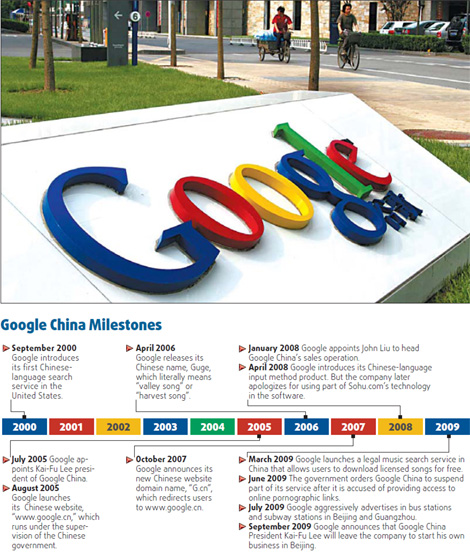

For many, Google Inc seems to have had a hard time in China, as its business has been consistently disrupted by its relationship with the Chinese government.
But the US search engine has established itself since officially opening for business in China in 2005, with a market share that increased about 10 percent during the past four years.
Then Kai-Fu Lee, the superstar chief of Google China operations since 2005, quit the company last month to launch a $115 million fund to finance Chinese technology startups.
Now the US search engine is looking for new ways to tap the world's largest population.
Most agree that the major challenge for Google has been its relationship with the Chinese government, which has been wary of the growth of the Internet search engine.
Since Google launched its Chinese-language search engine in 2003, one year earlier than domestic rival Baidu.com, its service has been intermittently stopped or delayed by authorities.
Google offered a compromise in 2005, launching its current Chinese-language service under the supervision of Chinese authorities.
Yet it failed to achieve a balance between the policies of US headquarters and the Chinese government, as some US headquarters staff believed that any compromise would hurt Western ideas on freedom of speech.
"I think what Google really needs is a China ambassador who can communicate with both Google's headquarters and the Chinese government," said Edward Yu, president of the domestic research firm Analysys International.
Yu said that although Google has many services that are better designed than its domestic rival Baidu, Google will not enjoy great success unless it wins the trust of the Chinese government.
John Liu, the former head of sales for Google China, is taking over Lee's responsibilities in business and operations divisions. The company also appointed Boon-Lock Yeo, director of Google's Shanghai engineering office, to take over Lee's engineering responsibilities.
Danile Alegre, Google's vice president, said Google adopts similar two-chief systems in most countries.
"When we were first in China, there were so many things to do, so we needed to find one person to represent Google," he said. "And now, we have the chance to get back to a system that works well in markets elsewhere."
Under the leadership of Lee, who was born in China's Taiwan province and studied in the United States, Google established an elite engineering team in China and released new services such as Music Search and Map Search that became popular among Chinese users.
Google's market share on the mainland rose to 27.8 percent last year from 16.1 percent in 2006, according to Analysys International, while Baidu's share grew to 62.2 percent from 53.3 percent.
Liu Ning, an analyst with the research firm BDA China, said Google established a solid foundation in China during the past three years under the leadership of Lee.
As one of the more prominent figures in the Chinese Internet sector, Lee also is popular among Chinese college students. His personal blog is widely followed, and he runs a popular website (www.kaifulee.com) designed to help young Chinese people achieve information technology (IT) careers .
Liu said Lee's departure will not have a great impact on the company, but that Google's attractiveness to college student might fade in the wake of Lee's departure.
Brand awareness
Compared with its relationship with the government, a lack of brand awareness in China is another challenge for Google.
Although Google has attracted many urban Chinese users, the search engine is not well known outside big cities in regions where Internet use is growing rapidly.
To localize its brand, Google introduced its Chinese name "Guge" three years ago. But that name was not fully embraced by the Chinese users, who struggled to pronounce and spell the name. In big cities, where many users speak English, some still call it Google. In other areas, many people call the search engine Gogo, instead.
"One of the biggest problems of Google in China is that most people don't know its brand," said Yu of Analysys International.
Google earlier this year launched an aggressive marketing campaign, posting its advertisements in bus stations and subways in Beijing, Shanghai, Guangzhou and other big cities.
The company did not have a sizable sales team in the country until last January, when John Liu was appointed to head Google China's sales operations. Google said last month that it would double the size of its sales team in China.
Innovation wins
Despite its struggles with the government and marketing challenges, experts said Google maintains an advantage in innovation over domestic rival Baidu.
Since last year, Google has been advertising the use of its Google Map service on cell phone platforms. China Mobile, the country's largest cell phone operator, last month announced plans to introduce a cell phone based on Google's Android system.
According to CNNIC, China's Internet users totaled 338 million by the first half of this year.
Mobile Internet users increased 32.1 percent in the first six months of this year to 155 million, boosted by China's launch of 3G services.
Liu of BDA China said that, compared with Baidu's focus on sales and marketing, Google is more focused on research and development and introducing new products.
"That may help the company to win in future competition," he said about Google.
Although Google has gained market share in China in the past three years, the competition between Google and Baidu is actually in the early stages, experts said, since the focus has been on both companies eroding shares from smaller search engines such as Yahoo! and Youdao instead of from each other.
Experts said the real competition will begin when the combined market share of Baidu and Google reaches 90 percent.

(China Daily 10/12/2009 page12)













